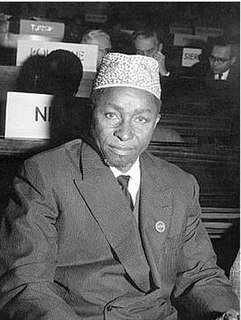A Quote by Amadou Hampate Ba
Writing is one thing and knowledge is another. Writing is the photographing of knowledge, but it is not knowledge itself. Knowledge is a light which is within man. It is the heritage of all the ancestors knew and have transmitted to us as seed, just as the mature baobab is contained in its seed.
Related Quotes
Surely knowledge of the natural world, knowledge of the human condition, knowledge of the nature and dynamics of society, knowledge of the past so that one may use it in experiencing the present and aspiring to the future--all of these, it would seem reasonable to suppose, are essential to an educated man. To these must be added another--knowledge of the products of our artistic heritage that mark the history of our esthetic wonder and delight.
To oppose knowledge is ignorant, and he who detests knowledge and science is not a man, but rather an animal without intelligence. For knowledge is light, life, felicity, perfection, beauty and the means of approaching the Threshold of Unity. It is the honor and glory of the world of humanity, and the greatest bounty of God. Knowledge is identical with guidance, and ignorance is real error
The goal of mankind is knowledge ... Now this knowledge is inherent in man. No knowledge comes from outside: it is all inside. What we say a man 'knows', should, in strict psychological language, be what he 'discovers' or 'unveils'; what man 'learns' is really what he discovers by taking the cover off his own soul, which is a mine of infinite knowledge.
In order to arrive at knowledge of the motions of birds in the air, it is first necessary to acquire knowledge of the winds, which we will prove by the motions of water in itself, and this knowledge will be a step enabling us to arrive at the knowledge of beings that fly between the air and the wind.
The knowledge we now consider knowledge proves itself in action. What we now mean by knowledge is information effective in action, information focused on results. Results are outside the person, in society and economy, or in the advancement of knowledge itself. To accomplish anything this knowledge has to be highly specialized.
Knowledge is a burden if it robs you of innocence. Knowledge is a burden if it is not integrated into life. Knowledge is a burden if it doesn't bring joy. Knowledge is a burden if it gives you an idea that you are wise. Knowledge is a burden if it doesn't set you free. Knowledge is a burden if it makes you feel you are special.
Each member of society can have only a small fraction of the knowledge possessed by all, and...each is therefore ignorant of most of the facts on which the working of society rests...civilization rests on the fact that we all benefit from knowledge which we do not possess. And one of the ways in which civilization helps us to overcome that limitation on the extent of individual knowledge is by conquering intelligence, not by the acquisition of more knowledge, but by the utilization of knowledge which is and which remains widely dispersed among individuals.
We have heard of a Society for the Diffusion of Useful Knowledge. It is said that knowledge is power, and the like. Methinks there is equal need of a Society for the Diffusion of Useful Ignorance, what we will call Beautiful Knowledge, a knowledge useful in a higher sense: for what is most of our boasted so-called knowledge but a conceit that we know something, which robs us of the advantage of our actual ignorance? What we call knowledge is often our positive ignorance; ignorance our negative knowledge.
The Christian religion, [Pascal] claims, teaches two truths: that there is a God who men are capable of knowing, and that there is an element of corruption in men that renders them unworthy of God. Knowledge of God without knowledge of man's wretchedness begets pride, and knowledge of man's wretchedness without knowledge of God begets despair, but knowledge of Jesus Christ furnishes man knowledge of both simultaneously.
Each is liable to panic, which is exactly, the terror of ignorance surrendered to the imagination. Knowledge is the encourager, knowledge that takes fear out of the heart, knowledge and use, which is knowledge in practice. They can conquer who believe they can. It is he who has done the deed once who does not shrink from attempting again.






































